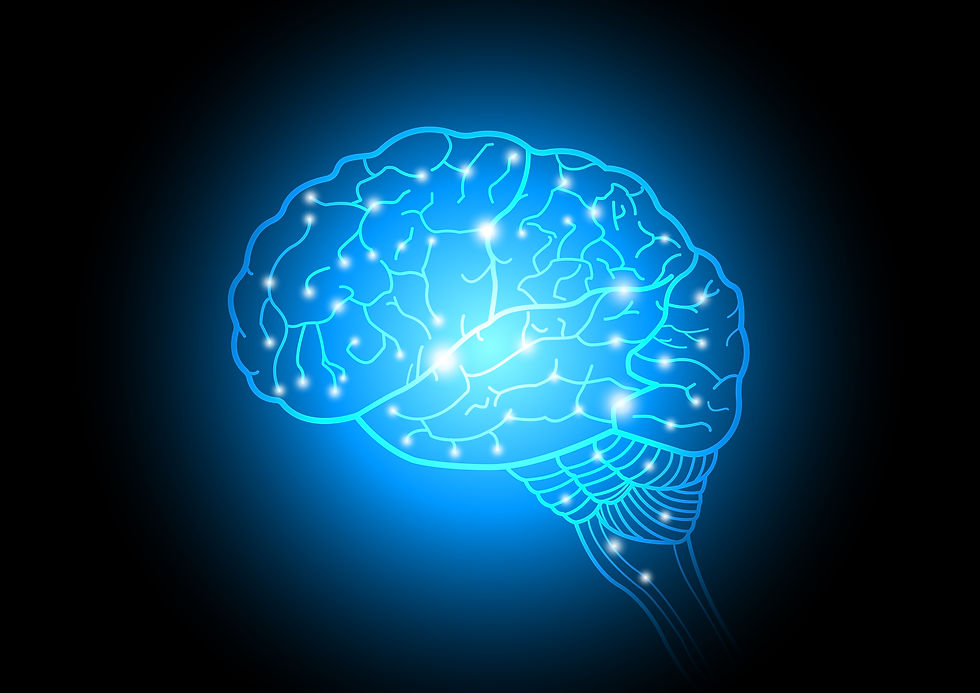Survive then Thrive Part 4: Nutrition
- Andrew Stephenson
- Aug 20, 2020
- 4 min read
In this post, we focus on nutrition, specifically in relation to stress, anxiety, and energy management. We humans have a strange relationship with food. For many species, it’s simply a means of fuel and survival. For people, it’s far more complex and layered with cultural, psychological, and social significance. We eat to celebrate. We eat to mourn. We eat for fuel. We eat to excess, and then we restrict and starve ourselves. Why have we overcomplicated it so much?
When it specifically comes to stress and burnout, food can have significant physiological and psychological effects that can help or hinder how we manage and recover from stress and fatigue. From a physiological perspective, food can impact brain chemicals that influence our thoughts and mood. For example, the neurotransmitter, serotonin, can help us feel calm, secure, and focused, whereas another neurotransmitter, dopamine, may increase feelings of anxiety. Complex carbohydrates will prompt the brain to make serotonin, whereas caffeine will increase dopamine levels. [Side note: You can learn more about brain chemistry and its impact on health and performance through our Chemistry for Success program.]
Other foods can cut levels of stress hormones, such as cortisol. By choosing healthy foods that support our immune system, lower blood pressure, and counter some of the impacts of stress, we can help to not only physically feel less stressed, but also decrease some of the negative impacts on our health that is caused by sustained stress and compensating behaviors.
Sleep is commonly disrupted by periods of high stress. Studies have recently shown that disturbed sleep and disrupted circadian rhythms can alter hunger and satiety hormones, meaning we crave hyper-palatable (i.e. “comfort”) foods. Often these foods are highly caloric and not great for sustaining energy. You can immediately begin to recognize the potential negative cycles of sleeping poorly, feeling fatigued, consuming excess caffeine and comfort foods, potentially feeling guilty about the comfort foods, and potentially further impacting sleep with excess stress and caffeine… leading to poor mood, more stress, and more poor sleep and fatigue. It’s surprisingly common, and a challenging loop to break.
So, what can we do? First, the insights above are incredibly important. Of course, the notion that the fuel we choose for our bodies has a direct impact on how we feel, perform, and recover is intuitive, but for many, particularly under periods of stress, anxiety, and fatigue, it’s really easy to forget. While simply saying “eating healthier will make you feel better” seems simplistic and foolhardy, making the conscious and deliberate recognition is the first step to counter-balancing. Otherwise, it’s surprisingly easy to inadvertently feed the negative loops of stress and fatigue.
· Complex carbohydrates: As noted above, carbohydrates tend to promote serotonin. But be wary of simple carbs and sweets that you may be craving if you are under-slept. They only promote short-term boosts and may lead to over-eating or negative feelings after. Some sources suggest that sugar and processed foods can contribute to inflammation which may contribute to mood disorders, including anxiety and depression. In contrast, complex carbohydrates will promote satiety and more sustained energy in addition to the serotonin boost. For the best impact, have complex carbohydrates on their own or two hours after your main protein meal (if you consume with protein, the effects on serotonin will be impacted). Try starting your day with warm oatmeal and fruit.
· Healthy fats: Fatty fish, avocado, and small servings (1/4 cup) of nuts can provide healthy fatty acids which may reduce surges in stress hormones. Aim for fish twice a week and a small handful of walnuts, pistachios, or almonds daily. An added bonus is the health benefits and positive impact on cholesterol and inflammatory markers.
· Vitamin-rich foods: Studies suggest vitamin C can curb levels of stress hormones (citrus, kiwi). Vitamin E (almonds) can help support your immune system and B vitamins, particularly B12 (salmon, Greek yogurt) can help boost energy.
· Consider reducing caffeine: Or, you could switch from coffee to tea. One study compared people who drank 4 cups of black tea daily for 6 weeks with people who drank another beverage. The tea drinkers reported feeling calmer and had lower levels of the stress hormone cortisol after stressful situations.
· Fruits, fiber, and food for gut health: Research is continuing to emerge regarding the importance of cut health and the microbiome for several aspects of health, including mental health. According to the American Psychological Association, gut bacteria contribute to producing a number of neurochemicals. It is believed that up to 95% of the body’s supply of serotonin (mentioned above) is produced by gut bacteria. Fresh fruits, fiber, fish, and fermented foods can help support thriving gut bacteria.
Food alone isn’t likely to eliminate stress. It will be more powerful if paired with other practices like exercise and sleep, however, it is becoming more and more clear that it plays a significant role in promoting mental health and resilience. Fueling your body in a smart and healthy way, in combination with exercise and healthy sleep will certainly reduce the impact of stress and risk of burnout.
For information on effective programs to promote mental fitness and resilience across your workforce, or within target executive and high-performance groups, please contact us!
Sources:
https://www.healthline.com/nutrition/vitamin-b-foods#TOC_TITLE_HDR_13
https://www.webmd.com/diet/ss/slideshow-diet-for-stress-management
https://www.npr.org/sections/thesalt/2016/03/02/468933610/sleep-munchies-why-its-harder-to-resist-snacks-when-were-tired
https://www.sutterhealth.org/health/nutrition/eating-well-for-mental-health





Comments